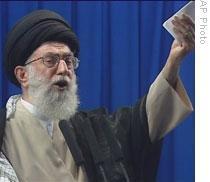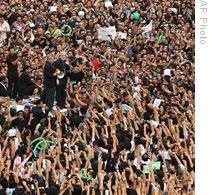2009-6-19
This is IN THE NEWS in VOA Special English.
 |
| Ayatollah Ali Khamenei speaking Friday, in a photo released by Iranian state broadcaster IRIB |
(SOUND)
Ayatollah Ali Khamenei spoke at Tehran University to a huge crowd for Friday prayers. It was his first speech since last Friday's election. "The result of the election comes from the ballot box," he said, "not from the street."
The supreme leader warned that if the unrest continues, protest leaders will be held responsible for any violence. At least seven protesters were killed Monday during clashes with pro-government militia.
Ayatollah Khamenei said the Islamic Republic would not cheat or betray the vote of the people. He said President Mahmoud Ahmadinejad won by eleven million votes. With that big a difference, he said, how could there have been cheating?
He denounced what he called interference by foreign powers. The crowd shouted "death to America" and "death to Britain."
The speech followed days of protests by hundreds of thousands of supporters of presidential candidate Mir Hossein Mousavi.
 |
| Mir Hossein Mousavi with supporters in Tehran on Thursday, in a photo released by his campaign media operation, Ghalam News |
The protests in Tehran and other cities have been the worst unrest in Iran since the Islamic revolution thirty years ago.
Iran's Guardian Council -- which supervises elections -- has offered to recount some votes and investigate complaints of wrongdoing.
But the government this week arrested many opposition members, activists and journalists. On Friday, European Union leaders urged the government to permit all citizens the right to assemble and express themselves peacefully.
Iran banned foreign media coverage of the protests. News agencies have depended heavily on information and images sent by Iranians using social media like Twitter, Facebook and YouTube. Young people especially are finding ways to get around Internet blocking.
On Friday, Facebook announced it is making its Web site available in the Farsi language. Google also has a new Farsi translating tool. And Twitter, at the request of the State Department, delayed a planned shutdown of its service for maintenance.
But American officials deny interfering in Iran's election process. President Obama said Monday that he was deeply troubled by the violence. But he also says it is up to Iranians to decide who their leaders will be. He has not stepped back from his policy of seeking to work with Iran after thirty years without diplomatic ties.
Some say he is being realistic. Others say he should forcefully denounce the election.
On Friday the House of Representatives passed a resolution expressing support for all Iranians who value freedom, human rights and the rule of law. The resolution condemns violence against demonstrators and the suppression of Internet and cellphone communication.
And that's IN THE NEWS in VOA Special English, written by Brianna Blake. I'm Steve Ember.